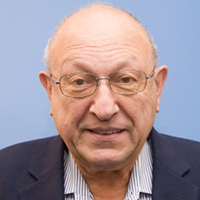Title: Probabilistic Design for Reliability in Electronics and Photonics and Its Role in Making a Viable IC Package into a Reliable Product
Presenter: Ephraim Suhir
Abstract: This tutorial addresses an evolving philosophy of accelerated testing in electronic and photonic packaging. The suggested methodology could be viewed as a possible extension and modification of Highly Accelerated Life Testing (HALT) for applications where a high level of operational reliability is critical, such as aerospace, military, long-haul communications, automatically driving vehicles, or medical devices, The highly focused and highly cost-effective Failure Oriented Accelerated Testing (FOAT) approach is suggested as a suitable experimental basis for the Probabilistic Design for Reliability (PDfR) concept. The PDfR concept is used to assess a product's lifetime and the corresponding never-zero probability of failure in the field, and to make this probability adequate for the given product and application. The general concepts are illustrated by numerical examples.

Presenter Biography: Ephraim Suhir is on the faculty of the Portland State University, Portland, OR, USA, Technical University, Vienna, Austria and James Cook University, Queensland, Australia. He is also CEO of a Small Business Innovative Research (SBIR) ERS Co. in Los Altos, CA, USA, is Foreign Full Member (Academician) of the National Academy of Engineering, Ukraine (he was born in that country); Life Fellow of the Institute of Electrical and Electronics Engineers (IEEE), the American Society of Mechanical Engineers (ASME), the Society of Optical Engineers (SPIE), and the International Microelectronics and Packaging Society (IMAPS); Fellow of the American Physical Society (APS), the Institute of Physics (IoP), UK, and the Society of Plastics Engineers (SPE); and Associate Fellow of the American Institute of Aeronautics and Astronautics (AIAA). Ephraim has authored about 450 publications (patents, technical papers, book chapters, books), presented numerous keynote and invited talks worldwide, and received many professional awards, including 1996 Bell Laboratories Distinguished Member of Technical Staff (DMTS) Award (for developing effective methods for predicting the reliability of complex structures used in AT&T and Lucent Technologies products), and 2004 ASME Worcester Read Warner Medal (for outstanding contributions to the permanent literature of engineering and laying the foundation of a new discipline “Structural Analysis of Electronic Systems”). Ephraim is the third “Russian American”, after S. Timoshenko and I. Sikorsky, who received this prestigious award. Last year he received the 2019 IEEE Electronic Packaging Society (EPS) Field award for seminal contributions to mechanical reliability engineering and modeling of electronic and photonic packages and systems and Int. Microelectronic Packaging Society’s (IMAPS) Lifetime Achievement award for making exceptional, visible, and sustained impact on the microelectronics packaging industry and technology.
Title: Thermal and Reliability Aspects of Automotive Power Electronics: Current Status and Future Trends
Presenters: Sukwon Choi, Gilberto Moreno, Douglas DeVoto
Abstract: This tutorial will first provide an overview of existing automotive power electronics thermal management systems. This includes descriptions of current packaging configurations and heat exchanger designs. The thermal performance of various automotive systems is quantified, and thermal bottlenecks are identified. Common failure locations (e.g., wire bonds, solder interface) and mechanisms within traditional package designs are then discussed. The second part of the tutorial will discuss future trends in automotive power electronics thermal management systems. This includes the vision towards efficient, high temperature, higher voltage wide bandgap (WBG) devices (e.g., silicon carbide, gallium nitride). Device-scale thermal modeling work will be presented to highlight the challenges associated with WBG devices based on gallium oxide. Concerns associated with packaging the higher temperature and high heat flux devices will be described. Finally, examples of alternative packaging solutions and cooling concepts (i.e., heat exchanger) that enable high temperature devices operation and increased power density will be presented.
Presenters' Biographies:

Gilbert Moreno leads research projects related to the development of advanced thermal management solutions for automotive power electronics components within NREL's APEEM Group. He has over 10 years of experience in the design and evaluation of thermal management systems.

Douglas DeVoto leads reliability evaluation and prognostics research for automotive power electronics within NREL’s Advanced Power Electronics and Electric Machines (APEEM) Group, with a focus on bonded interfaces and electrical interconnects. He has 10 years of experience in accelerated testing, thermal, and thermomechanical FEA modeling for electric-drive vehicles and other applications.

Sukwon Choi is an Assistant Professor of Mechanical Engineering at the Pennsylvania State University. His group focuses on the thermal characterization and electro-thermal co-design of ultra-wide bandgap power electronics and thin film piezoelectric micro-electro-mechanical systems (MEMS).